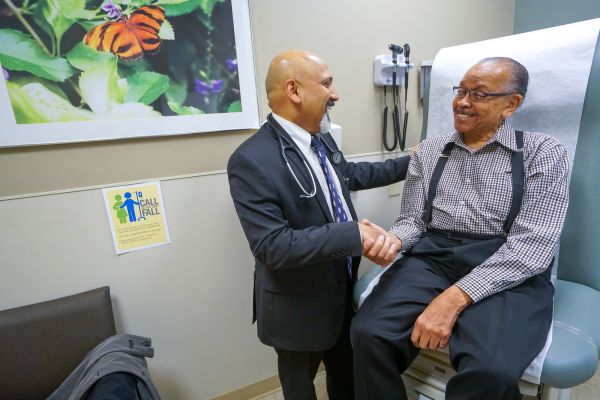One in seven men will be diagnosed with prostate cancer at some point in his life, but not all men with the disease will need to be treated for their illness.
Some men do face a higher risk of developing prostate cancer, including Black men, men with a family history of prostate cancer and/or certain genetic mutations.
Not all mutations carry the same weight or result in the same increased risk for prostate cancer, says Margaret Hill, PhD, MS, CGC, a genetic counselor at Roswell Park Comprehensive Cancer Center.
“In our DNA, we all have genes associated with hereditary risk for cancer. These genes are important for protecting us from developing cancer in the first place. Some of these genes are key in helping protect males from developing prostate cancer, but they also often help protect all of us from other types of cancers. It depends on which gene it is.”
Gene changes, called mutations, linked with prostate cancer are found in 5-10% of men diagnosed with prostate cancer, meaning those patients have a hereditary link to the illness.
The only way to know for sure whether a man’s genetic history includes mutations that increase his risk for cancer is to test for them. In order to have genetic testing done, a patient should have a genetic risk assessment conducted through genetic counseling. The identification of some particular gene mutations could make him a better candidate for getting prostate cancer screening before the age of 45, or age 40 for Black men, regardless of his family history of prostate cancer.
Genetic counseling and testing are recommended for men who have a family history of these cancers:
- metastatic prostate cancer
- intraductal/cribriform histology prostate cancer
- prostate cancer and known Ashkenazi Jewish ancestry
- prostate cancer and determined to be in the high- or very high-risk group based on tumor features
- prostate cancer and at least one relative diagnosed with breast cancer at or under the age of 50, or diagnosed with ovarian, pancreatic or metastatic/intraductal/cribriform prostate cancer at any age
- prostate cancer and two or more first-degree relatives with breast or prostate cancer at any age on the same side of the family
- prostate cancer and a strong family history of some other cancers, such as having two more relatives with colorectal cancer on the same side of the family
Genetic counseling and testing are also recommended for men who have a first-degree relative (parents, siblings, children) with metastatic/intraductal/cribriform prostate cancer or who are in a high-risk group or who have a strong family history of certain other cancers.
Men are encouraged to share their personal and family medical history with their physicians to determine whether they should have genetic counseling and whether any prostate cancer early detection tests are appropriate, in addition to deciding when those tests should begin.
Life has opened back up. Now it’s time to get back to health.
If you’ve waited to schedule your cancer screening, delayed your doctor’s appointments or are ignoring that lingering symptom that is just not right – now is the time to act.
Learn MoreMen with a brother, father or multiple family members diagnosed with prostate cancer under the age of 60 or who died from prostate cancer should consider starting prostate cancer screening when they are 10 years younger than the youngest age at which someone in their family was diagnosed, or at age 40 for Black men (age 45 for all other races), whichever age is earlier, Dr. Hill says.
Men who have the BRCA-1 or BRCA-2 gene mutation, often associated with breast cancer in women, should begin getting prostate cancer screenings at age 40, she adds.
As is true with other types of cancers, men with an increased risk of developing prostate cancer can do a few things to mitigate that risk, including adopting a healthier diet, quitting smoking and exercising regularly. Early screening itself will not reduce the risk of prostate cancer but following a doctor’s recommendations can lead to earlier detection and potentially better outcomes.




